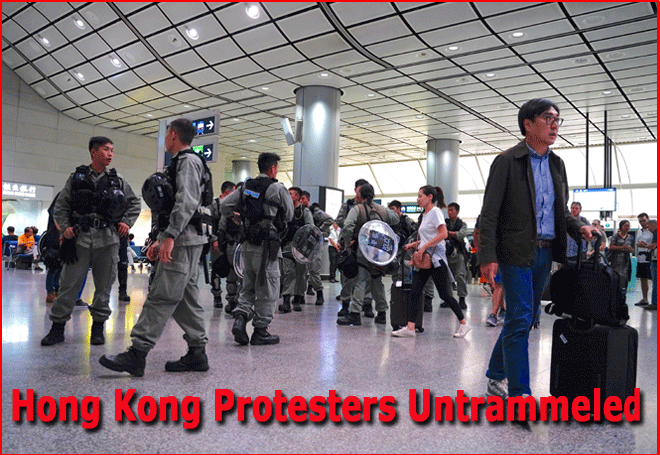
As police patrol the airport express central train station in
downtown Hong Kong, Saturday, Sept. 7, 2019, protesters were untrammeled
in their continued actions against Mainland China’s pressure
on the former Crown Colony. Authorities were limiting airport transport
services and controlling access to terminals Saturday during a second
straight weekend of disruption following overnight demonstrations
that turned violent. |


Ram Menen has seen many seasons come and go, spending more than
two decades, first as part of the launch team and then as top executive
of Emirates SkyCargo, where he led that organization to its preeminent
position in the air cargo world. Today, happily retired in Luxembourg
and Kuala Lumpur, Ram is a much sought after air cargo authority,
who readily shares his take on 2019 in an exclusive FlyingTypers interview.
|
 This is all new territory for the world.
I don’t think in recent memory, we have ever seen such volatility
in the marketplace. This is not the traditional economic cycle,
so it is getting almost impossible to make any sane predictions! Most
of the issues today have a very strong political connotation and, I would
say, are self-inflicted in the world’s major economies causing far-reaching
effects world over. The U.S.-China trade war, the Brexit uncertainty,
and the current unrest in Hong Kong are all going to have a long-term
effect on the world economy. This is all new territory for the world.
I don’t think in recent memory, we have ever seen such volatility
in the marketplace. This is not the traditional economic cycle,
so it is getting almost impossible to make any sane predictions! Most
of the issues today have a very strong political connotation and, I would
say, are self-inflicted in the world’s major economies causing far-reaching
effects world over. The U.S.-China trade war, the Brexit uncertainty,
and the current unrest in Hong Kong are all going to have a long-term
effect on the world economy.
Typically, the stock markets should have
tanked by now, however, they have not!! It is becoming extremely difficult
to understand the sentiments on which the world stock market is tracking
the highs and lows. One thing for sure is that there is a lot of wealth
creation in progress!
Now that the U.S. tariff on a lot of the
electronics and other consumer goods has been postponed till mid-December,
we should see some higher demand for air capacity on the TransPac sector
during November and December in last minute inventory top up before the
imminent tariff implementation.
The demand for capacity on the U.S. to China
is likely to be very low as China looks for its imports from elsewhere.
We are likely to see larger demand to China from Latin American countries,
especially for perishable commodities.
In the European arena, again the Brexit
situation has become very unpredictable. As of today, it looks like they
will be kicking the can further down the road, creating more uncertainty.
 Inventory
management is likely to be a bit of a challenge. The original stocks are
now being drawn down, and the replenishment process will result in some
air cargo volumes, however, the level of demand for air capacity will
depend on whether the UK will leave EU on October 31, 2019 or some time
in 2020. Brexit is likely to boost demand for direct capacity inbound
to UK from the Trans-Atlantic, Africa and Far-Eastern regions. The losers
in this deal will be surface carriers (trucks and ferries), who rely on
the internal EU/UK volumes. There is likely to be lack of outbound volumes
ex UK which will create challenges for pure freighter operators, as UK
exports are unlikely to find new markets in a hurry. Inventory
management is likely to be a bit of a challenge. The original stocks are
now being drawn down, and the replenishment process will result in some
air cargo volumes, however, the level of demand for air capacity will
depend on whether the UK will leave EU on October 31, 2019 or some time
in 2020. Brexit is likely to boost demand for direct capacity inbound
to UK from the Trans-Atlantic, Africa and Far-Eastern regions. The losers
in this deal will be surface carriers (trucks and ferries), who rely on
the internal EU/UK volumes. There is likely to be lack of outbound volumes
ex UK which will create challenges for pure freighter operators, as UK
exports are unlikely to find new markets in a hurry.
The long-term effects of Hong Kong’s
political situation, where violence has crept into what were peaceful
protests, will be interesting to watch as this has really shaken the market
confidence in its role as a very stable major world hub.
Luckily, cargo movements were not directly
affected, other than reduction in available belly capacity. Regular freighters
and extra sections have kept the cargo flow moving. However,
given the unpredictability that the political situation is creating and,
the fact that the mainland is creating its own cargo hubs, could mean
lesser cargo being routed via the Hong Kong hub. The best Hong Kong can
hope for is that memories will be short, and it can get back to normal
operations soon, provided there is a resolution to the current turmoil.
Post turmoil and in return to normalcy,
there is likely to be higher demand in the  short
term for inbound cargo, especially for renovation of all the destruction
caused by the rioters. short
term for inbound cargo, especially for renovation of all the destruction
caused by the rioters.
Whatever the situation, 2020 will be a challenging
year for the world air cargo industry.
|




